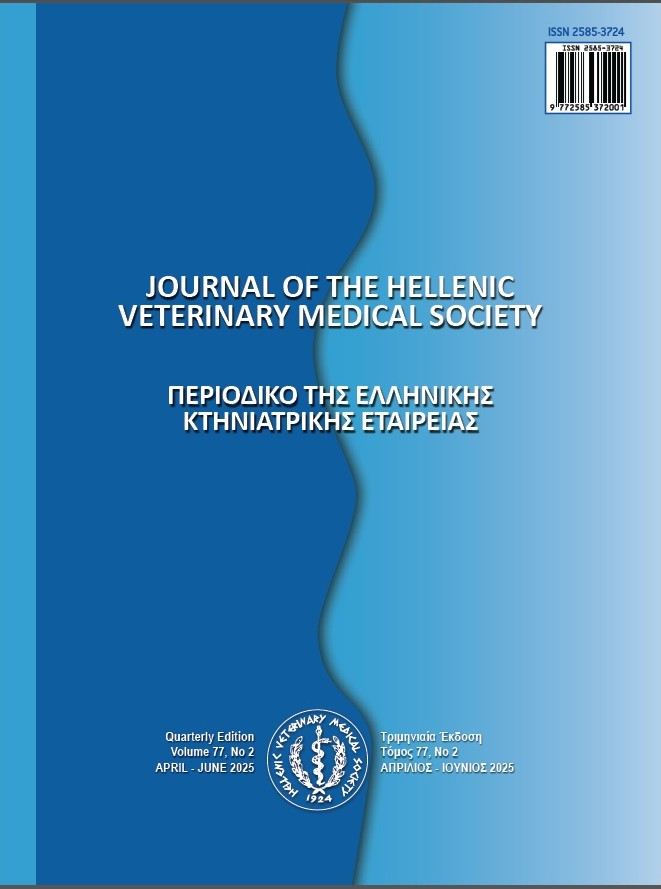Comments on EU legislation governing organic animal production and the role of values in agriculture
Περίληψη
It was the food crises in the second half of ’90s such as the BSE (Bovine Spongiform Encephalopathy) scandal, the dioxin episode, the GMOs (Genetically Modified Organisms) issue, the rBGH (recombinant Bovine Growth Hormone) as well as the cross-resistance case of antibiotics used as anabolics in animal feed, that accelerated the adoption of ECC (European Economic Community) Regulation 1804/1999, on the marketing of organic animal products. This piece of legislation included provisions such as conversion of animal and land from conventional to organic, feeding, hygiene with emphasis on preventing diseases, keeping of animals, animal excretions (faeces and urine) handling, housing, and free-range areas. However, the organic livestock system because of the prohibited use of chemically synthesised allopathic veterinary medicines, contains a greater element of weakness, vulnerability, risk and cost in tackling epidemic problems. Issuing of EEC Regulation 1804/1999 was done with an element of haste. In a spirit of compromise between Member States and an attempt to reach consensus, legal tools were used to solve technical problems so that a great number of derogations (exceptions) were introduced. These allowed the use of certain additives, as well as tethered animals and castration of newborn piglets, although welfare is a central component of the system. However, derogations should be avoided in legislation where harmonization is pursued since they bring distortion to the market. The validity of these derogations had expiry dates, but EU (European Union) appeared to be hesitant to lift some of these derogations. In the present article the authors attempt to identify the main derogations of the relevant EU law for organic animal production and comment on their role and implications on the purity of this alternative system as it is applied in practise. Furthermore, the article focuses on the issue of derogations of the law through the prism of the principles of animal science. The more recent EU Regulations 834/2007 and 889/2008, which repealed among others the initial Regulation 1804/1899, are also commented upon. Mention is also made to geographical issues arising from the exception questions posed again with the new Regulations. Attention is also paid to the definition of what is meant by “organic product”. Reference is also made to the “conventionalisation” phenomenon. Finally, certain conclusions are drawn concerning the relationship between setting standards and the role of values in agriculture, social aspects, pursued policy, and future research in the field.
Λεπτομέρειες άρθρου
- Πώς να δημιουργήσετε Αναφορές
-
Zoiopoulos, P., & Natskoulis, P. (2025). Comments on EU legislation governing organic animal production and the role of values in agriculture. Περιοδικό της Ελληνικής Κτηνιατρικής Εταιρείας, 76(2), 8999–9008. https://doi.org/10.12681/jhvms.39158
- Τεύχος
- Τόμ. 76 Αρ. 2 (2025)
- Ενότητα
- Special Article

Αυτή η εργασία είναι αδειοδοτημένη υπό το CC Αναφορά Δημιουργού – Μη Εμπορική Χρήση 4.0.
Οι συγγραφείς των άρθρων που δημοσιεύονται στο περιοδικό διατηρούν τα δικαιώματα πνευματικής ιδιοκτησίας επί των άρθρων τους, δίνοντας στο περιοδικό το δικαίωμα της πρώτης δημοσίευσης.
Άρθρα που δημοσιεύονται στο περιοδικό διατίθενται με άδεια Creative Commons 4.0 Non Commercial και σύμφωνα με την άδεια μπορούν να χρησιμοποιούνται ελεύθερα, με αναφορά στο/στη συγγραφέα και στην πρώτη δημοσίευση για μη κερδοσκοπικούς σκοπούς.
Οι συγγραφείς μπορούν να καταθέσουν το άρθρο σε ιδρυματικό ή άλλο αποθετήριο ή/και να το δημοσιεύσουν σε άλλη έκδοση, με υποχρεωτική την αναφορά πρώτης δημοσίευσης στο J Hellenic Vet Med Soc
Οι συγγραφείς ενθαρρύνονται να καταθέσουν σε αποθετήριο ή να δημοσιεύσουν την εργασία τους στο διαδίκτυο πριν ή κατά τη διαδικασία υποβολής και αξιολόγησής της.



